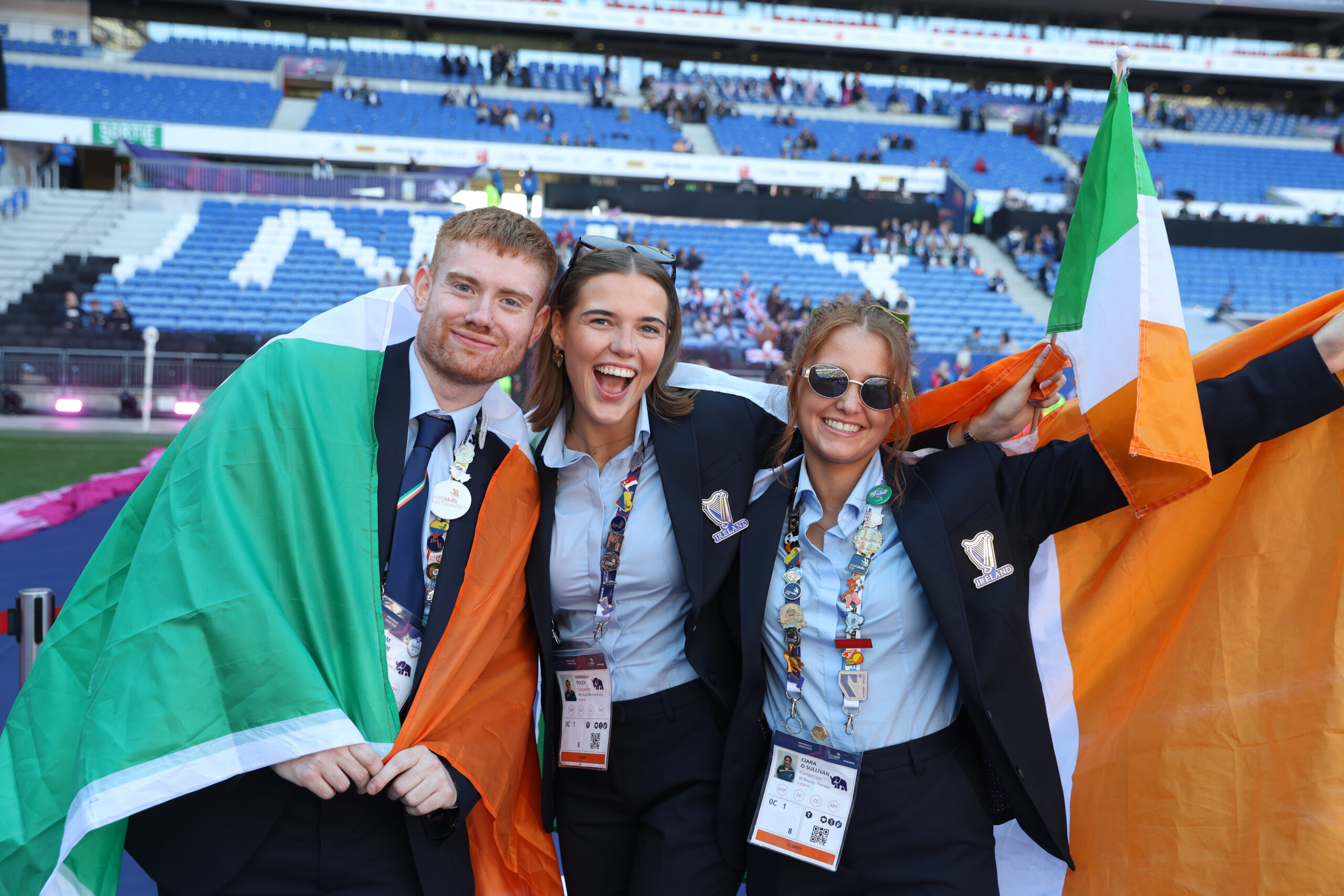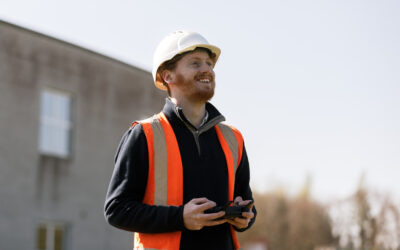Pictured above: Construction and Building Technology was among the competition categories at this year’s WorldSkills 2024 in Lyon, France. Pictured representing Team Ireland at the closing ceremony are, l-r, Liam Roche (Digital Construction) Hannah Foley (Visual Merchandising) and Ciara O’Sullivan (Beauty Therapy).
SIOBHÁN BREATNACH joins Team Ireland at WorldSkills 2024 in Lyon, France
“There is no economy without skills,” says Patrick Atkinson. The Chadwicks Group CEO, who is also a board member of SOLAS, is energised by the industry’s potential to grow outside traditional academic routes when it comes to jobs for Ireland.
Chadwicks is one of the key sponsors for Worldskills Ireland, an annual event held at Dublin’s RDS to educate young people about trade apprenticeships and careers.
Atkinson was a key member of the entourage in Lyon, France where he was among those supporting Team Ireland’s 17 competitors at WorldSkills 2024, the organisation’s biennial global gathering.
This year, 1,400 young people from 70 countries competed across 62 skill areas, including construction and building technology.
“Every year we talk about schools, who has the highest success rate of kids going to university. We never include apprentices in that. We don’t consider them worthwhile or it’s not newsworthy. What’s wrong with us?” says Atkinson, who believes greater momentum behind vocational learning is essential.
“I’m not dissing degrees but we do need to respect the other side of that coin. You can have all the accountants, lawyers and marketing people in the world, but if you don’t have someone baking your bread and building your roads, then you don’t have an economy. We don’t appreciate that nearly well enough. We don’t value it as a country. It’s for other people’s kids, it’s not for ours.”
It’s easy to see why WorldSkills has been christened the Olympics for skills – and it’s not just because of its high octane, slickly produced opening and closing stadium ceremonies.
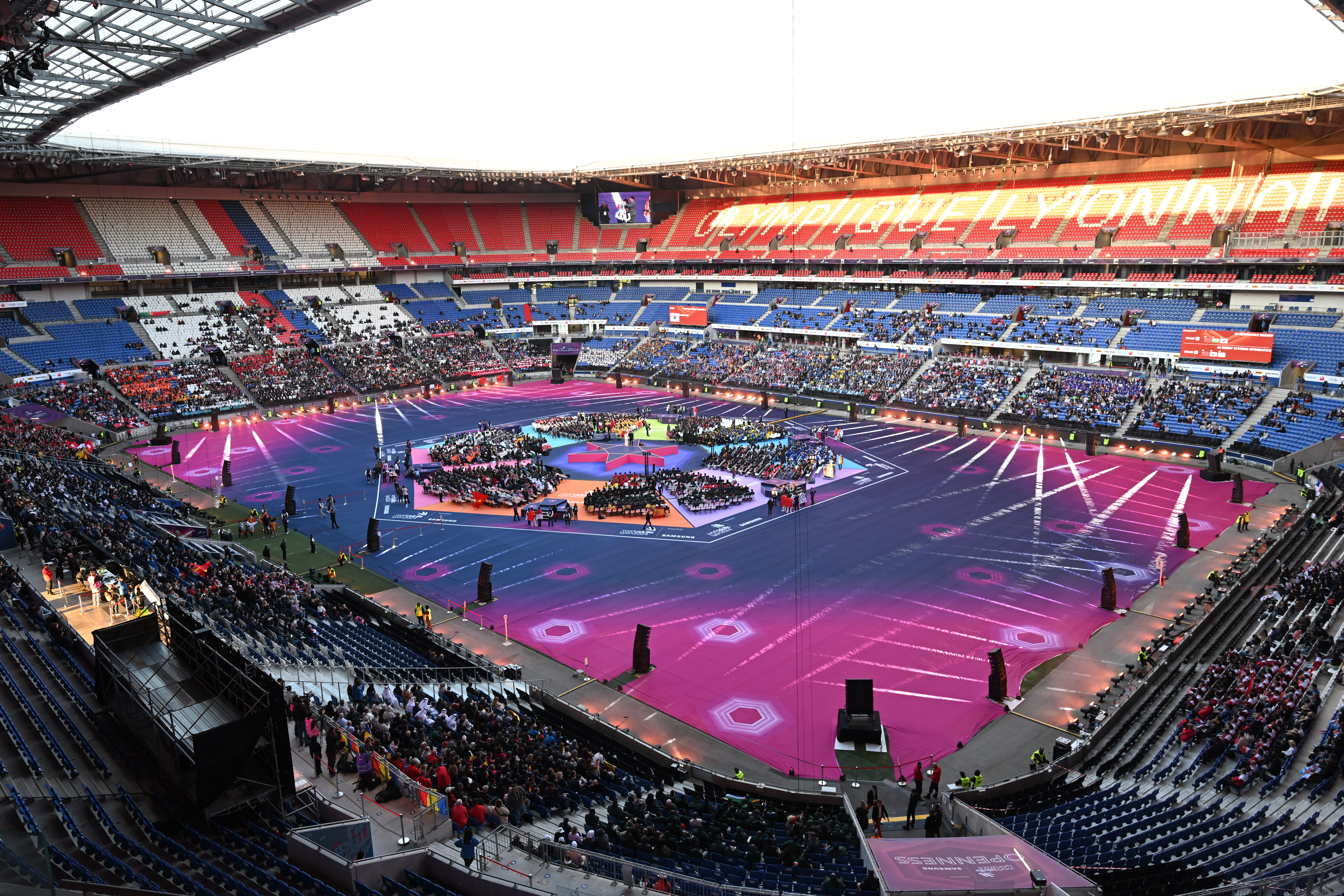
The WorldSkills Closing ceremony at the Groupama Stadium in Lyon, France
Athletic-like levels of dedication, confidence and enthusiasm swirled vibrantly around Eurexpo Lyon, the competition’s 140,000 m2 convention centre home where nations battled it out for gold in September, vigorously supported during the week by 250,000 event visitors – students, parents and industry experts among them.
Atkinson has been involved with the materials side of the construction industry for over 30 years, starting out with Wavin and later Saint-Gobain where his introduction to WorldSkills began.
With a clear shortage of skills in Ireland, encouraging people into the sector is in the interest of the nation.
In his opinion, and if approached in the right way, there are countless opportunities within apprenticeships and vocational skills.
Though true change and progress, he admits, may take a generation.
“Diversity across the board is an issue but we have a bigger challenge in mindset, that’s not just about gender,” he says. “It’s about persuading parents that this a strong alternative to an academic education.
“As a country we were deprived access to universities back over 100 years ago, a lot of us couldn’t afford to send our kids to university, thankfully that cost has come down. But when you’ve been deprived of something you really push for it,” he adds.
“What we, as a society, need is to pitch vocational education and academic education at exactly the same level. Like they do in Germany, Switzerland, Austria and even here in France to some extent. We don’t see it that way [in Ireland]. People who are doing apprenticeships in the colleges are seen as second-class citizens. It’s so wrong.”
Challenging perceptions
A survey published by Worldskills on members of the Institute of Guidance Counsellors revealed over 77 per cent have seen a shift in student attitudes over the past three years, with more now being receptive to pursuing apprenticeships or skills-based careers.
Parental or family influence remains the top factor for how students make career choices. There is power, therefore, in events like WorldSkills, which can challenge outdated perceptions.
Minister for Further and Higher Education, Research, Innovation and Science Patrick O’Donovan was among leaders to visit WorldSkills in Lyon, describing it as a “perfect platform to show the world what we can do in these areas, while also promoting the value of skills-based learning in Ireland”.
Supported by government funding, WorldSkills Ireland has run national competitions annually since 1956 offering young Irish talent – all competitors are under 25 years old – the chance to compete at the international awards, which have been running for 47 years.
This year’s Team Ireland competed in France in categories including Building and Construction, Engineering and Manufacturing, Transport and Logistics, Cyber and ICT, Social and Personal Services, as well as Creative Arts and Fashion.
Just 10 days after WorldSkills Lyon, thousands of students from 300 schools descended on Dublin’s RDS Simmonscourt for the national event, which is supported by industry leaders across the construction sector, including the Construction Industry Federation.
Of the 172 students and apprentices who competed on the national stage, 53 were in construction-based competitions from architectural stonemasonry to bricklaying and plastering, with each hoping to secure a place at the next international event in 2026 in Shanghai, China.
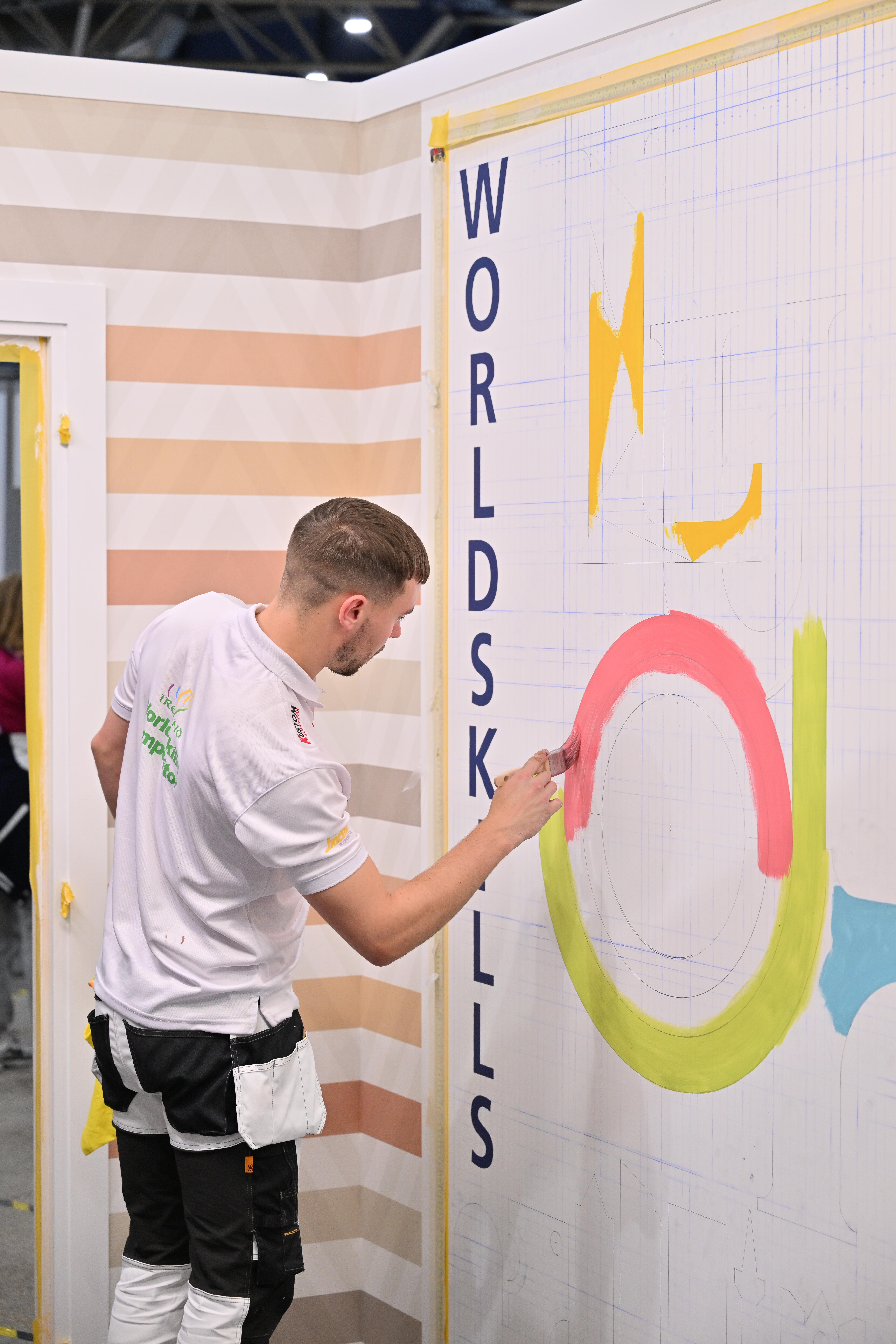
Eric Bates taking part in the Painting and Decorating competitions at WorldSkills in Lyon
Back in Lyon, Ronan Murphy, Sisk’s Joinery Works and Training Centre Manager, acknowledges the enormous changes happening within the industry. He says there is a certain poetry to an event like WorldSkills in that it brings both the traditional hand skills of old together with the technology that is being embraced by the sector today.
Sisk, a WorldSkills sponsor, has championed a dedicated training centre for more than 60 years. “We’ve always had a complete appreciation for what skills do for our business,” says Murphy, emphasising the power that comes from growing and nurturing talent through apprenticeships.
“The modern construction business has well over 60 careers within it, some of those people will never pick up a saw or wear steel toes boots or hard hats, but they are an integral part of a modern construction business.”
As he sees it, construction must keep pace with other industries in what it can offer young people and job seekers.
“I would turn the challenge back on employers,” he says. “Options are so varied now, it’s something that goes right through the construction business – how do we keep people? It’s going well beyond small perks, we need to be thinking much broader than that. There are a great many pre apprenticeship courses now and I’d love to see more of those.
“We have a tradition in Ireland of corralling people a little bit towards third level courses, a lot of the time because that’s what a generation did before,” he says. “There are so many ways now into education that we’d much rather see kids follow their heart to begin with. I was lucky at 13 that I knew I wanted to be a carpenter, that was my focus, I had generations behind me doing that.”
Besides, as Murphy adds, further learning can always follow down the line. “I was almost 50 when I went back to do a degree. It’s never too late if you want to supplement your education,” he says.
Changing mindsets
But for those who might not have a family connection to the industry, how do you start?
“As an industry we have been historically poor at showing people how to do that, and it’s still a big challenge,” Murphy says. “There’s a need to focus more on schools and technical teachers.”
Michael Hourihan is the Official Delegate at WorldSkills Ireland. An electrician by trade, his role is to manage Team Ireland on the organisational side.
“I’m passionate about apprentices and skills, I come from that background myself, particularly the traditional craft apprenticeships,” he says.
“There’s a huge problem with apprenticeships in Ireland, the numbers aren’t there. The system is prolonged and protracted. It doesn’t run smoothly. There is academic snobbery everywhere.
“We have to change the mindset of parents, teachers and students themselves,” he adds. “WorldSkills Ireland, which we run every year in the RDS, is doing just that. It’s time to open eyes, engage and see the benefit of what we’re doing. It’s not a deadend job, it’s something you can progress from. There are options.”
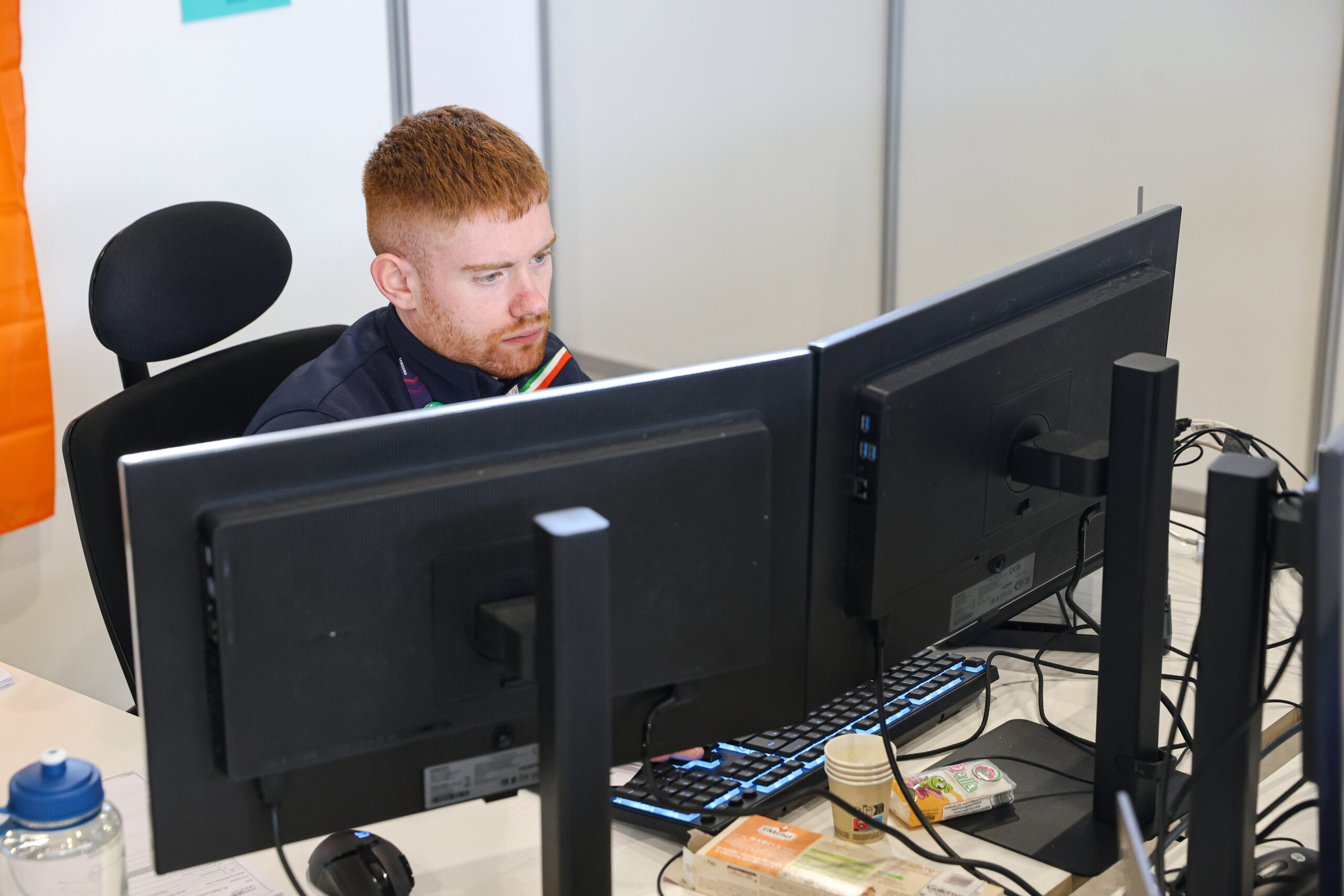
Liam Roche competes in Digital Construction at WorldSkills 2024
Chadwicks recently partnered with TU Dublin, investing €250,000 in the development of Ireland’s first Design and Construct Centre at the university’s Grangegorman campus to meet future architecture, engineering and construction educational needs.
“It’s not a light switch, it’s all of us working and pushing,” says CEO Patrick Atkinson. “If I’m not from an industry where do I start? If I’m not from that background and I’m 17 years old, how do I access that? Ireland Inc needs to make that access so much easier. Have a list of potential employers and somebody coordinating that. Pockets exist but it needs to be so much slicker and easier. It’s on the CAO form, it’s there, but not done in the same way.
“We have to make it as easy as possible for people to access the information and apprenticeship positions. That’s a huge campaign that needs to be done,” he adds.
“We need to make it attractive. My personalview is that we should pay them more in their first year. Tell them you value them by paying them a minimum wage. It was different when we had huge unemployment, people would accept it’s a route in. But now that we don’t have that and labour is scarce, money talks.”
Best of nation
In true Olympic style, WorldSkills participants compete for gold, silver and bronze medals. A Best of Nation medal and Medallion for Excellence, are additional accolades awarded to the best performing competitor from each country and competitors who obtain a high level of excellence, respectively.
Team Ireland secured five Medallions of Excellence, which were awarded in front of thousands of spectators at a closing ceremony in Lyon’s Groupama Stadium.
The winners were Daniel Kearns, Constructional Metal Work; Alanna Moffit, Cookery; Liam Roche, Digital Construction; Kate Ryan, Restaurant Service and Sean McLoughlin, Electrical Installations. Sean also won the Best in Nation medal.
The 22-year-old from just outside Naas, Co. Kildare, is completing an apprenticeship and works for his family’s company GMAC Electrical.
Day-to-day operations there includes everything from CCTV, emergency lighting, access control and car chargers to residential and commercial electrical works.
“WorldSkills has been a real door opener for me,” he says. “I went with the attitude that I had nothing to lose. I’m not one for sitting in a comfort zone.”
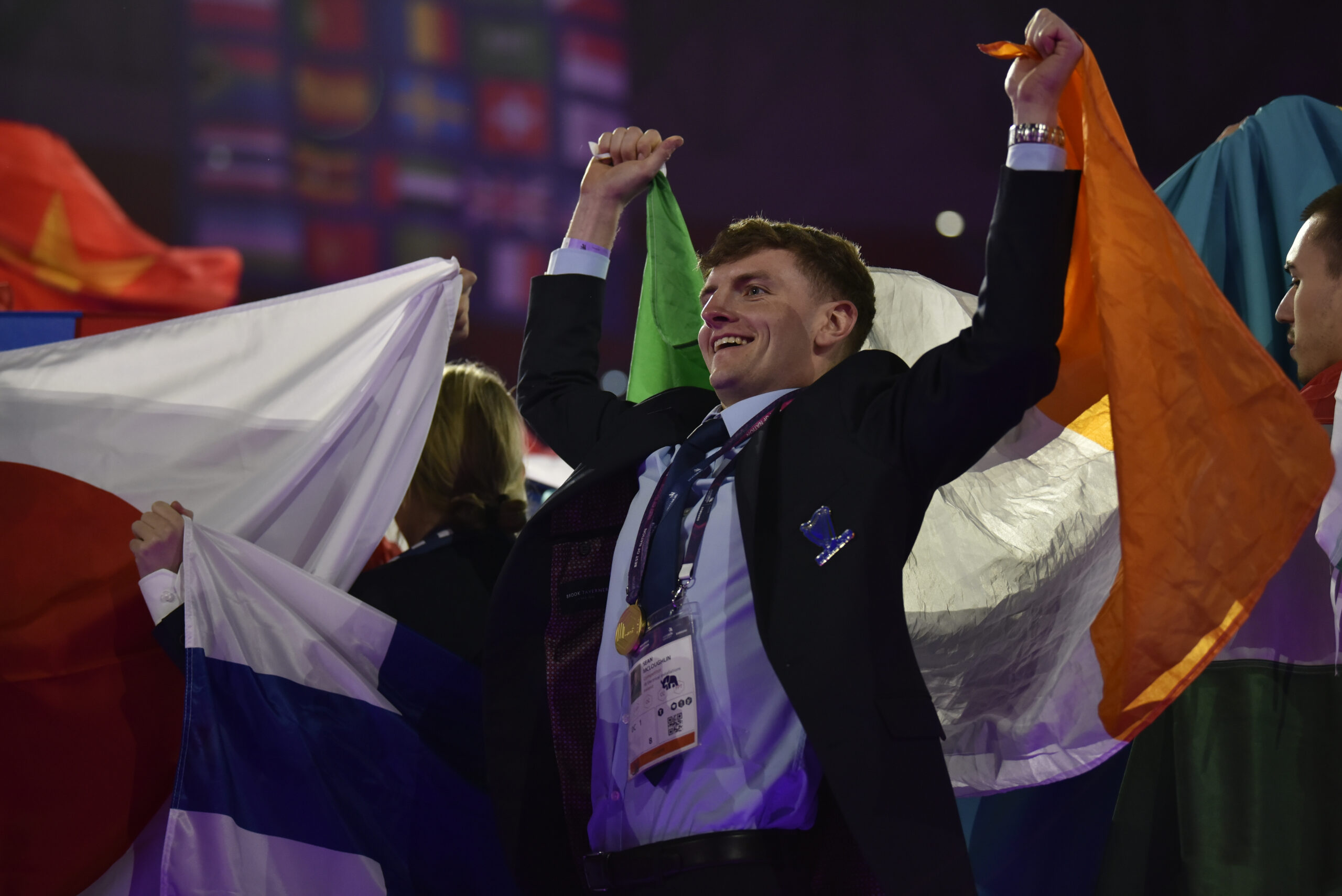
Best in Nation medal winner Sean McLoughlin celebrates at the closing ceremony
Supported by his Expert Peter Gilligan, prior to taking part in France, Sean was given the opportunity to compete in preparatory competitions in China.
“That was a good confidence boost and benefitted me skill wise,” he says. “I’ve taken a liking now to the KNX side, programming and automation, so that’s something I will look into for the future.”
He hopes to lecture down the line too and support learning for the generation following him. His parents, he says, have also been an invaluable support. “It’s great to have that backbone behind you, you can try things,” Sean says, adding that construction runs in the family.
“My grandfather was a plasterer and building contractor. I remember since I was a young fella I always wanted to be out on a job with my dad. I always had a passion for it and that’s stuck with me throughout the years. In school, there wasn’t a summer I wasn’t working.
“It’s nice to work in a field that you love,” he adds. “That would be the key thing I would say to someone young, make sure you really love what you’re doing. If you think you want to do something [in construction], go out in TY, do it for a few weeks and see if you really like it.”
Sean’s father Glen McLoughlin is full of praise for events like WorldSkills and what the industry, in general, can offer.
“It’s a great journey for him, for any young person,” he says. “There are a lot of kids out there who are just not for third level education. Parents and career guidance are pushing them and then two to three years down the line they are doing a job they hate.
“Four years for an apprenticeship is a short time and then you can do what you want to do, especially in electrical, which branches out,” he adds.
“Yes, you start off wiring a house but after that the world is your oyster. You can go to big companies like Siemens, ABB, work on computers whatever you want. It’s so sought after and the Irish market is so good.
“Sean started his apprenticeship with us four years ago and got the opportunity to come to Lyon through his college in ATU Sligo. It’s about him, the apprentice, wanting to get further in their career, a rewarding career.”
Industry life is more than ‘lads on a building site’. “That’s not the full picture.,” he says. “Skills are an essential part of life.”
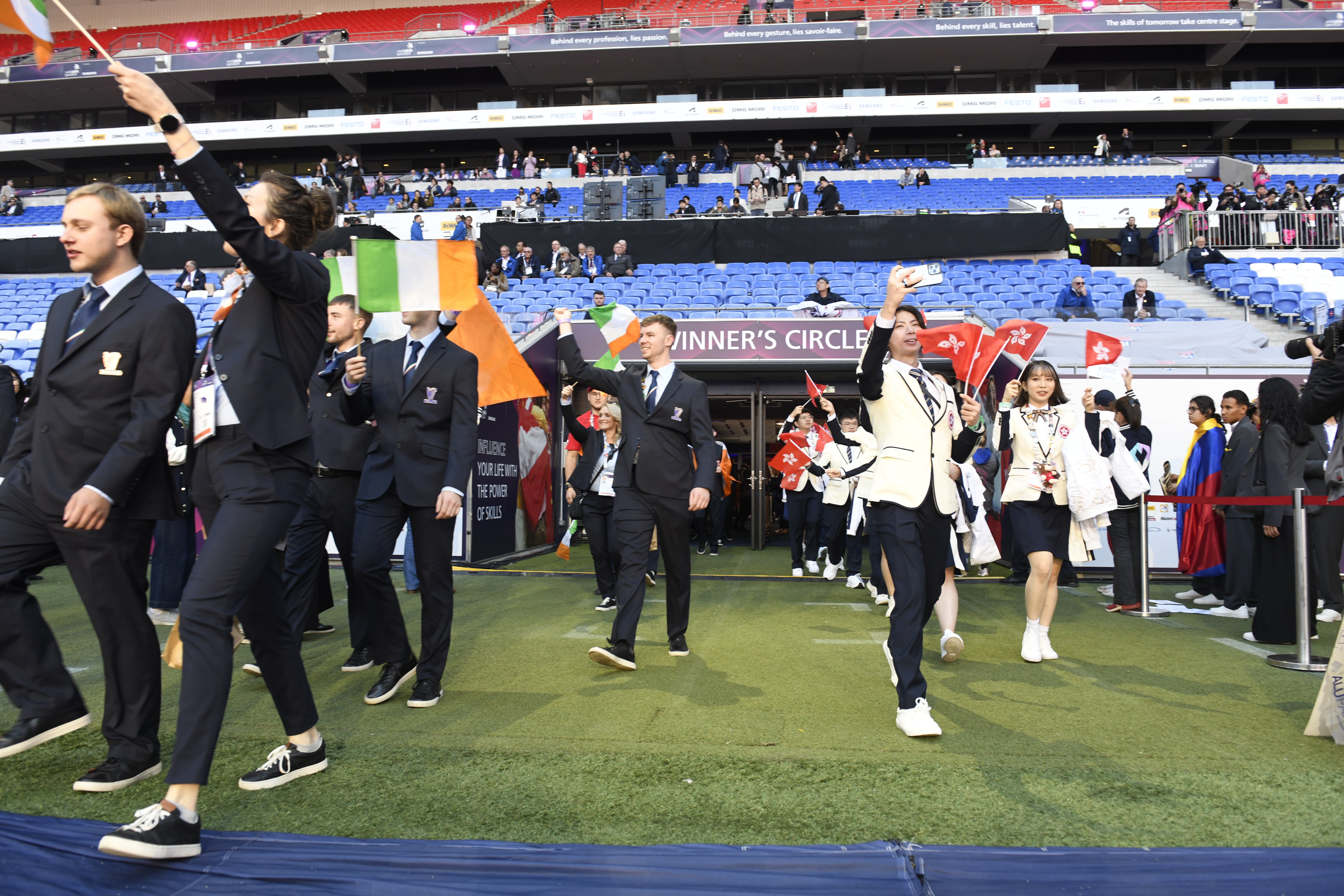
Team Ireland exits the winners’ circle at Groupama Stadium in Lyon, France
Team Ireland’s onstruction and building technology competitors, Worldskills Lyon 2024
Cabinetmaking
Keith Roberts, Galway, full-time student, ATU Letterfrack
Digital Construction
Liam Roche, Wexford, student, BIM practitioner, architectural technology student, SETU
Electrical Installations
Sean McLoughlin, Kildare, GMAC Electrical employee, completing apprenticeship, attended LOETB and ATU
Joinery
Joe Kelly, Galway, apprentice carpenter/joiner, attended Donegal ETB and ATU Sligo
Painting and Decorating
Eric Bates, Offaly, apprentice painter and decorator, completing training at CDETB Ballyfermot and TU Dublin

